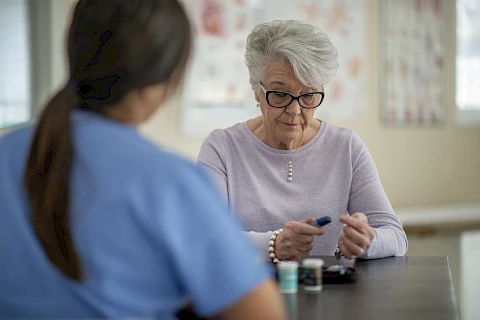
Diabetes is a common condition among seniors, affecting their quality of life and overall health. Effective diabetes management is vital for seniors, as it helps prevent complications and supports a longer, healthier life.
What to Know About Senior Diabetes
Diabetes is a disease that affects how the body uses blood sugar or glucose. For seniors, this can lead to various health challenges, including difficulties with vision, nerve damage, and slower healing times. Seniors may face challenges like remembering to take medications or maintaining a healthy diet.
1. Medication Management
Managing medications is critical for seniors with diabetes. Use a pill organizer to arrange medications by day and time. Ensure medications are taken as prescribed, as missing doses can lead to blood sugar spikes or drops. Be aware of potential side effects and consult a healthcare provider if you notice anything unusual. Sticking to a medication schedule keeps blood sugar levels stable and helps prevent complications.
2. Monitoring Blood Sugar Levels
Regularly monitoring blood sugar levels is a cornerstone of diabetes management. Accurate monitoring can be achieved by using a reliable glucose meter. Seniors should check their blood sugar as recommended by their doctor, which could be several times a day.
Understanding the target blood sugar range for seniors is essential. This information helps caregivers know what levels are healthy and when to provide help. Utilize technology like apps and digital monitors that can offer reminders and track readings.
3. Encouraging Healthy Lifestyle Choices
A healthy lifestyle plays a role in diabetes management. A balanced diet that focuses on whole grains, fruits, and vegetables is key. Meal planning can prevent last-minute unhealthy choices. Involve seniors in meal prep as much as possible, making it a collaborative effort.
Physical activity is also crucial. Encourage seniors to engage in daily exercise, such as walking or gentle yoga, which can help control blood sugar levels. Seniors should always consult a doctor before starting a new fitness routine. Also, emphasize the importance of staying hydrated and getting enough sleep to maintain overall health.
4. Recognizing Signs of Diabetes Complications
Being able to recognize signs of complications can save lives. Common diabetes-related complications include:
- Vision problems: blurred sight, floaters
- Nerve damage: numbness or tingling in hands and feet
- Infections: slow-healing sores
Early detection of these signs is important. If any symptoms are spotted, prompt medical attention is needed to prevent them from worsening.
5. Working with Healthcare Professionals
Building a strong relationship with healthcare providers is vital. Caregivers should prepare for medical appointments by noting down any questions or observations about the senior's condition. Open communication with doctors ensures that seniors receive the best possible care.
Local resources and support groups in New York City can provide additional assistance. These groups offer education, support, and a sense of community for both seniors and caregivers.
Diabetes Management Doesn’t Have to Be Hard
Caregivers can make a significant impact by taking an active role in medication management, lifestyle choices, and cooperation with healthcare professionals. You don't have to do it alone. For personalized caregiver support and senior care services in Manhattan, Bronx, Brooklyn, and Queens, contact us at Senior Helpers New York City. We are ready to provide the guidance and resources you need.